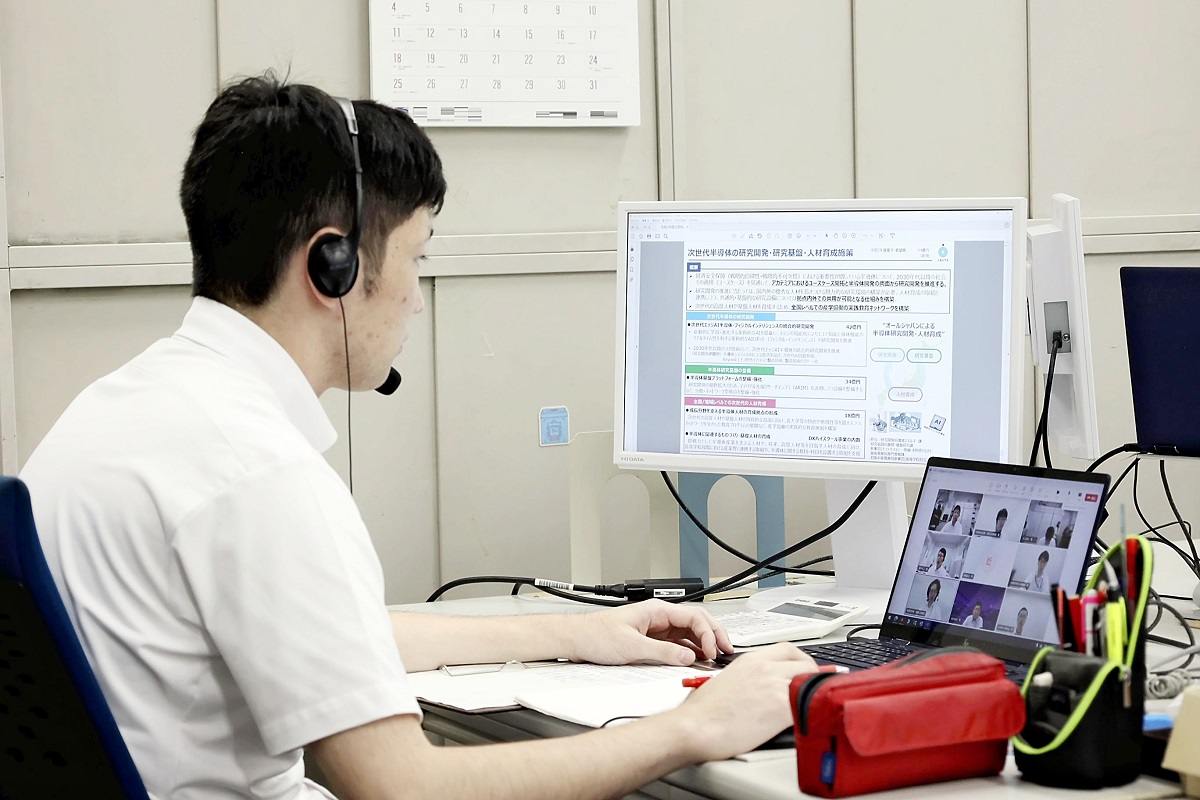Swelling Budget Requests Challenge Fiscal Discipline; Domestic, Intl Problems Fuel Upward Pressures on Expenditure

A Finance Ministry official checks budget request data sent by ministries and agencies at the ministry in Chiyoda Ward, Tokyo on Friday.
6:00 JST, September 1, 2024
The budget request for fiscal 2025 is expected to total over ¥117 trillion, marking a record high for the second consecutive year.
With domestic and international problems such as price increases, a graying society with a declining birthrate and a harsher security environment piling up, the amount requested by ministries and agencies will only keep growing.
As “a world with interest rates” has become a reality in Japan, the key question is how to secure the necessary budgets while maintaining fiscal discipline. The challenges the government faces are becoming ever more serious.
A succession of requests
“Price increases and the workstyle reform of doctors has left management of university hospitals in a difficult situation. We hope that more consideration will be given to these issues.”
The draft of the Health, Labor, and Welfare Ministry’s budget request was discussed at a meeting of the ruling Liberal Democratic Party’s relevant division. From the legislators attending the meeting, there was a succession of calls for expanding measures to tackle the uneven distribution of doctors, who are concentrated mostly in urban areas.
Social security expenditures, including medical care and pensions, account for one-third of the total government budget and have a huge impact on people’s lives.
The government has decided on a policy of curbing the growth of social security expenditures each fiscal year to within the range expected by the natural increase associated with an aging society. The expenditures are set at about ¥410 billion for fiscal 2025.
Some legislators pointed out that the baseline “does not take into account increases in prices and wages, and it is out of tune with existing practices.”
Masaki Ogushi, the division director, responded by saying, “We must proceed while consulting with the labor and finance ministries, including through conducting a review.”
Fiscal discipline
The total amount of budget requests for fiscal 2025 from ministries and agencies has increased by about ¥3 trillion compared to previous fiscal year’s ¥114.385 trillion total.
In the fiscal 2025 budget request guidelines that the government decided on in July, it established a special quota totaling about ¥4 trillion for important policies such as wage hikes and measures against high prices, the same as in fiscal 2024. “Itemized budget requests,” where the amounts are not specified, may be included in the quota.
Some of the itemized requests made by ministries and agencies include measures for which the amount could have been calculated at the request stage if the details were closely examined.
Included are such measures as “investment support in the fields of artificial intelligence and semiconductors” by the Economy, Trade and Industry Ministry and “the promotion of the nationwide deployment of swift and smooth emergency services using My Number Card” by the Internal Affairs and Communications Ministry. If the amounts were specified, the total budget request amount would have been even higher.
Due to changes in the Bank of Japan’s monetary policy, interest rates have been on an upward trend. In light of this, the Finance Ministry has raised its assumptions for estimating the cost of interest payments on government bonds.
According to the Finance Ministry’s estimate, a 1% higher increase in interest rates than the market prediction will expand the range of increase in interest payment expenses year by year, which it says will swell to ¥8.7 trillion in fiscal 2033.
At a press conference on Friday, Finance Minister Shunichi Suzuki emphasized, “We will take appropriate actions in the budget compilation process so that fiscal discipline does not loosen and that the budget does not increase solely because of the itemized requests.”
Economic measures add burden
The new cabinet to be formed following the LDP presidential election on Sept. 27 may formulate new economic measures.
In June, before announcing his intention not to run for the election, Prime Minister Fumio Kishida explained that he would have benefits for pensioner-led and low-income households included in economic measures to be formulated in autumn.
This is perceived within the government as meaning that: “The prime minister himself will resign, but his measures will be passed down to the new cabinet.”
The Kishida cabinet has spent heavily on measures to help people cope with price increases and stimulate the economy, including by providing subsidies to curb gasoline, electricity, and gas bills, as well as fixed-rate tax cuts for income and other taxes.
If the new cabinet follows Kishida’s line, concerns will grow over the increasing strain being placed on public finances.
Hideaki Tanaka, a professor at Meiji University, noted: “The Kishida administration has been conspicuous for its hand-out policies tinged with lavish spending. There is concern that fiscal discipline might be further loosened in anticipation of the dissolution of the lower house and an ensuing general election.”
Top Articles in Politics
-

Japan PM Takaichi’s Cabinet Resigns en Masse
-

Sanae Takaichi Elected Prime Minister of Japan; Keeps All Cabinet Appointees from Previous Term
-

Japan’s Govt to Submit Road Map for Growth Strategy in March, PM Takaichi to Announce in Upcoming Policy Speech
-

LDP Wins Historic Landslide Victory
-

LDP Wins Landslide Victory, Secures Single-party Majority; Ruling Coalition with JIP Poised to Secure Over 300 seats (UPDATE 1)
JN ACCESS RANKING
-

Producer Behind Pop Group XG Arrested for Cocaine Possession
-

Japan PM Takaichi’s Cabinet Resigns en Masse
-

Man Infected with Measles Reportedly Dined at Restaurant in Tokyo Station
-

Israeli Ambassador to Japan Speaks about Japan’s Role in the Reconstruction of Gaza
-

Videos Plagiarized, Reposted with False Subtitles Claiming ‘Ryukyu Belongs to China’; Anti-China False Information Also Posted in Japan






















